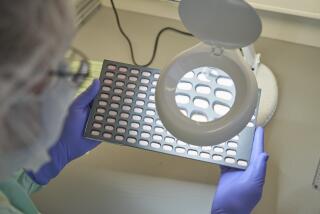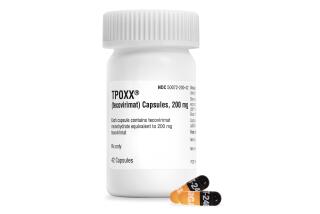CDC Discourages Use of Popular Anti-Gonorrhea Drugs
- Share via
California doctors should stop prescribing a widely used, inexpensive class of antibiotics to treat gonorrhea because a growing number of infections have grown resistant to the drugs, known as fluoroquinolones, federal health officials said Thursday. The antibiotic family includes Cipro, which gained fame last fall for treatment of inhalation anthrax.
The recommendation by the federal Centers for Disease Control and Prevention narrows the options available to treat gonorrhea, a sexually transmitted disease. Only the cephalosporin class of antibiotics has been proved to work without resistance, but those drugs typically cost more per pill and sometimes must be injected. Experts do not believe, however, that the change will discourage treatment.
The CDC’s recommendation--part of its 2002 treatment guidelines for sexually transmitted diseases--marks the first time since 1987 that the health agency has essentially blacklisted an antibiotic for treatment of gonorrhea in the mainland United States. Back then, the drug was penicillin.
In September 2000, the CDC recommended against prescribing Cipro to treat gonorrhea in Hawaii and among people who have traveled to Southeast Asia, where resistance is widespread.
Gail Bolan, director of STD control for the California Department of Health Services, said the CDC recommendation is “the right thing to do.... It’s our only option at this point,” said Bolan, who served on the CDC advisory panel that reviewed the guidelines. “It doesn’t bode well when you’re trying to control an infectious disease and you’re left with one class of antibiotics.”
About 5% of the gonorrhea cultures in California tested in the second half of 2001 were found to be resistant to fluoroquinolones, compared with 1% in 2000. The figures are far lower in the rest of the country.
Federal health officials estimate about 650,000 new cases of gonorrhea occur each year in the United States, although far fewer are actually reported. The most common symptoms include discharge from the sexual organs and painful or difficult urination.
Among the CDC’s other recommendations Thursday:
* Women with chlamydia should be rescreened for the infection three to four months after they complete treatment. Researchers have found that 15% to 30% of women become reinfected with chlamydia within six months because their male partners never receive treatment.
* The spermicide nonoxynol-9 should not be used to prevent STDs or HIV. Some studies have found that it causes genital lesions in the vagina, and may in fact increase the risk of HIV transmission. The spermicide has also been found to cause damage to the lining of the rectum, providing an entry point for STDs.
Condoms lubricated with nonoxynol-9 “have a shorter shelf life, cost more and have been associated with urinary tract infections in women,” the CDC said.
* Gay and bisexual men should be tested at least annually for HIV, in addition to chlamydia, syphilis and gonorrhea, the CDC said. They should also be vaccinated against hepatitis A and B.






